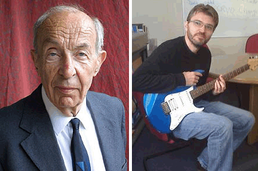Seminar 2nd March 2011 5:30 p.m. University of Southampton, Building 54 (Mathematics), Lecture Theatre 4A
Landsberg Mathematics Colloquium: Seeking Computational Ultimates
Professor Vlatko Vedral
University of Oxford and the National University of Singapore
- Web page
- http://www.soton.ac.uk/maths/news/events/School%20Colloquium%2002%2003%2011%20%20Landsberg%20Memorial.pdf
- Categories
- Biomathematics, Climate, Ecology, Energy, Evolutionary Algorithms, Heat transfer, Scientific Computing
- Submitter
- Petrina Butler
This lecture will be given in honour of the late Professor Peter Landsberg, late distinguished head of the mathematics department at the University of Southampton.
The speaker will be Professor Vlatko Vedral of the University of Oxford and the National University of Singapore, and the talk will be entitled "Seeking Computational Ultimates."
Friends of Professor Landsberg's will perhaps recall that his final book, on the heroes of quantum physics, was entitled "Seeking Ultimates"
The talk should be accessible to a general audience, and be of interest to all who knew the late Professor Landsberg, as well as anyone following the continuing public interest in the foundations of quantum theory and its relation to reality and also to theories of computation.
Abstract
This lecture celebrates the life and work of Peter Landsberg (1922-2010), who was professor of applied mathematics in the department of Mathematics 1972-87, and who died on February 14 2010. Peter was well-known for his wide interests in mathematics, physics, engineering, and indeed science in general. His overarching view of science was articulated in his final book “Seeking Ultimates: An Intuitive Guide to Physics” (2000).
The field of thermodynamics has had considerable influence on the study of quantum information and computation. This talk focuses on three areas to which Peter Landsberg contributed significantly. The first is Caratheodory’s formulation of the second law of thermodynamics, which is in quantum information used to understand entanglement, a key resource for quantum computation. Landsberg belonged to a small group of physicists who quickly grasped the advantages of Caratheorery’s treatment and built on it.
The second area is in generalised thermodynamics where Peter and I wrote an influential paper (that we thought would end the whole field – but it, in fact, made it flourish!). Here we have the possibility of possessing a negative amount of information. Unsurprisingly, this is difficult, but nevertheless not impossible to interpret (hint: think “entanglement” again).
The last area is in an emerging field of quantum biology. Why are plants so good at utilising the solar energy, while we humans find it rather hard to design efficient solar cells? In the late 1970s and early 1980s Peter Landsberg did some pioneering work leading to the concept of the “Landsberg efficiency”. This is a more realistic bound for the solar cell efficiency than the usual Carnot efficiency. I will discuss recent work on photosynthesis that may be able to test Peter’s ideas. This will leave us with an important question: can we actually “reverse engineer” the photosynthetic information processing that is going on inside plants, so as to improve our own energy consumption efficiency?
Details
You are cordially invited to the reception which will be beforehand at 5:30pm outside the venue.
The event is free but places should be reserved by contacting:
Faith Winteridge, School of Mathematics, University of Southampton SO17 1BJ
Tel: 023 80595155; Email: f.winteridge@soton.ac.uk
Free parking will be available on the Highfield Campus from 5pm in any undesignated parking bay.
Please note that any changes to the above arrangements will be on our website at http://www.southampton.ac.uk/maths and here:
